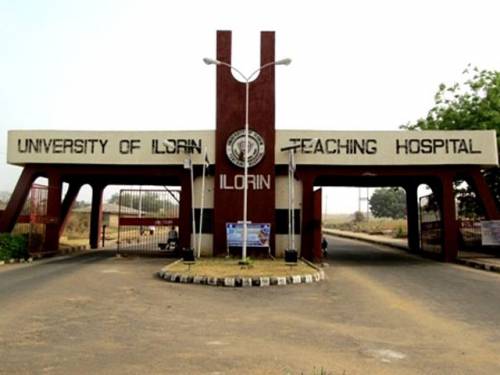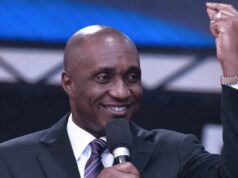A UK-based surgeon, Mrs. Oluwakemi Elizabeth Oduwaiye, has accused doctors at the University of Ilorin Teaching Hospital of causing the demise of her 69-year old father through medical negligence.
On 26 November, 2015, Mrs. Oduwaiye phoned her father who, she had been previously informed, was experiencing abdominal pains. The 69-year old man, she said, told her that he was on admission in a private hospital.
According to Sahara Reporters, the surgeon demanded to speak with the doctor at the hospital, who recommended the patient’s transfer to the University of Ilorin Teaching Hospital.
The private medical practitioner said her hospital had discovered that the patient was suffering from intestinal obstruction. It seemed a wise recommendation and Mrs. Oduwaiye immediately advised her father to go to the teaching hospital and demand to get an abdominal CT scan done.
In addition, Mrs. Oduwaiye disclosed to Sahara Reporters, she made phone calls to inform the doctors she knew to try to get her father to have a CT scan done to determine the cause of the obstruction and appropriately deal with it.
It did not go as planned, as her father never had that CT scan done. He died nine days later.
Two days after her father arrived at the teaching hospital, explained Mrs. Oduwaiye, she got a call from a relative who was caring for her father.
The relative, she said, told her to advise her father to cooperate with the medical team, as he had pulled off the nasogastric (NG) tube passed via his nose to his stomach to provide nutritional support and for decompression of abdominal obstruction.
She said she called to find out why he pulled the tube out and was told that he was complaining of breathing difficulties. The relative further said if her father had not removed the tube, he would have died, as he practically could not breathe.
Being familiar with the process, Mrs. Oduwaiye said she told the relative not to worry, as she suspected, from the symptoms described to her, that the tube might have been passed to his airway rather than his stomach. She advised that her father should be left alone so the medical team could re-pass the tube the next morning.
It never went as suggested. Mrs. Oduwaiye said she was informed that the nurses were angry with her father for not cooperating with the medical team, saying he should not have removed the tube despite choking on it.
“In fact, they challenged him to get his daughter from England to come and treat him instead. My father’s intestinal obstruction was in the large bowels and he had not eaten for days, neither was he vomiting, therefore a nasogastric tube at that stage was completely irrelevant to his care, in my opinion. My father was, however, told that the tube was the remedy to his large bowel obstruction,” she told SaharaReporters.
The following day, Mrs. Oduwaiye demanded to speak with one of the doctors to find out the definitive management plan for her father’s symptoms. This was because she was getting worried about him being left untreated for three days.
She got through to a doctor, who suggested that the obstruction was from faecal impaction and they had done a few rectal washouts with minimal results.
Mrs. Oduwaiye said she then asked if there was a plan to give her father any oral laxative as well as enemas to at least soften the stool to move it further down for the enemas to be more effective.
The doctor, according to her, replied that the man could not be fed through the mouth and that there was no plan to give him an oral laxative.
Her worries grew. She explained to the doctor that she suspected something graver because she was not convinced that intestinal obstruction from faecal impaction was possible in a person as fit, healthy and active as her dad.
“I also mentioned the obvious weight loss as well as a subtle line in his scan report that suggested to me it might be something more serious. The doctor said the symptoms were common in his age group,” added Mrs. Oduwaiye.
The alarm bells began to chime more loudly.
“I immediately rang my relative, who happens to be a senior doctor at the same hospital, about my concerns, and he advised me to leave the managing team to manage my dad the way they know best – the Nigerian way,” she explained.
Mrs. Oduwaiye decided to take a step back, trusting her doctor relative to handle things. She disclosed that she was also told that the managing consultant was yet to review her father four days after his admission in the hospital for acute intestinal obstruction, a development she considered bizarre.
This is because intestinal obstruction is a surgical emergency that must be dealt with immediately. She demanded to know why a CT scan was yet to be done and they said they were waiting for the consultant to review.
“I believe my relative must have facilitated the ‘consultant review,’ which happened later. The surgical consultant also requested for a CT abdomen scan. After paying for the CT, it was not done as the radiologist reported that a certain element in my father’s blood test result was high and he could therefore not have it done until it was corrected,” Mrs. Oduwaiye narrated.
The blood test result, she added, was four days old. She argued that if the patient had been given fluids, they would have corrected the blood result.
The man, however, repeated the blood test the same day and was never reviewed.
“My father was left in the ward with no further interventions until 3 November 2015. The medical team are always reluctant to manage patients over the weekend for obvious reasons,” she said.
Mrs. Oduwaiye then got a call from her sister, who told her that her father was crying in pain. This, she said, made her more worried, as her father never cried; not even when his mother died.
This nudged her to call a friend to get the surgeon on call to review him, as she suspected that he might have developed further complications like perforated bowels, a life-threatening condition.
Frustration then crept in.
“I was later told that he had been given an injection and he was ‘stable’ although still crying in pain. At this point, I got frustrated as I could not help my father,” Mrs. Oduwaiye said.
What followed was that she was informed that they were preparing him for surgery the next afternoon, nine days after his admission, for intestinal obstruction with possible bowel perforation. Whatever hope Mrs. Oduwaiye had evaporated when she got a call the following day informing her that her father had died.
She immediately asked for an autopsy report to establish the cause of his death, a request she said the hospital staff tried to dissuade her from following through. But she insisted that she wanted an autopsy report and proceeded to pay for one.
Ten months after and despite paying, the hospital has refused to release the autopsy report, forcing her to contact three different lawyers to start a legal action.
That has brought no progress, as she said the lawyers were either intimidated by senior administrators of the hospital or bribed into submission.
The most recent hurdle in her path to legal action, Mrs. Oduwaiye said, was the claim that she is not a male child of the deceased, despite being solely responsible for her father’s care until his death.
“I am regarded as an inferior child because I am female. Why is the situation in Nigeria so impossible? Why is it impossible to get justice in the face of obvious injustice? Why is nobody doing anything about this? Why is everyone satisfied with the status quo? Why are people not crying out for help and why is it that the few of us that cry out never really get the help we seek?” she asked in frustration.















The worst place to go for threatment is any university teaching hospital and the worst time is when they’re havinq their practicals or what ever they call it…
If u hv any members of ur family going through the hospital treatment consider him dead, honestly the worst place to go.